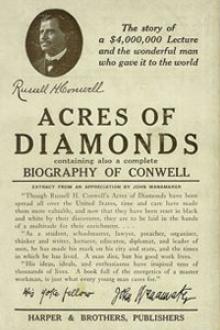Acres of Diamonds - Russell H. Conwell (big screen ebook reader .txt) 📗

- Author: Russell H. Conwell
- Performer: 1599869802
Book online «Acres of Diamonds - Russell H. Conwell (big screen ebook reader .txt) 📗». Author Russell H. Conwell
_It was good enough for mother and it’s good enough for me!
It was good on the fiery furnace and it’s good enough for me!_
Thus it went on, with never-wearying iteration, and each time with the refrain, more and more rhythmic and swaying:
_The old-time religion,
The old-time religion,
The old-time religion—
It’s good enough for me!_
That it was good for the Hebrew children, that it was good for Paul and Silas, that it will help you when you’re dying, that it will show the way to heaven—all these and still other lines were sung, with a sort of wailing softness, a curious monotone, a depth of earnestness. And the man who had worked this miracle of control by evoking out of the past his memory of a meeting with two of the vanished great ones of the earth, stood before his people, leading them, singing with them, his eyes aglow with an inward light. His magic had suddenly set them into the spirit of the old camp-meeting days, the days of pioneering and hardship, when religion meant so much to everybody, and even those who knew nothing of such things felt them, even if but vaguely. Every heart was moved and touched, and that old tune will sing in the memory of all who thus heard it and sung it as long as they live.
V GIFT FOR INSPIRING OTHERSTHE constant earnestness of Conwell, his desire to let no chance slip by of helping a fellowman, puts often into his voice, when he preaches, a note of eagerness, of anxiety. But when he prays, when he turns to God, his manner undergoes a subtle and unconscious change. A load has slipped off his shoulders and has been assumed by a higher power. Into his bearing, dignified though it was, there comes an unconscious increase of the dignity. Into his voice, firm as it was before, there comes a deeper note of firmness.
He is apt to fling his arms widespread as he prays, in a fine gesture that he never uses at other times, and he looks upward with the dignity of a man who, talking to a higher being, is proud of being a friend and confidant. One does not need to be a Christian to appreciate the beauty and fineness of Conwell’s prayers.
He is likely at any time to do the unexpected, and he is so great a man and has such control that whatever he does seems to everybody a perfectly natural thing. His sincerity is so evident, and whatever he does is done so simply and naturally, that it is just a matter of course.
I remember, during one church service, while the singing was going on, that he suddenly rose from his chair and, kneeling beside it, on the open pulpit, with his back to the congregation, remained in that posture for several minutes. No one thought it strange. I was likely enough the only one who noticed it. His people are used to his sincerities. And this time it was merely that he had a few words to say quietly to God and turned aside for a few moments to say them.
His earnestness of belief in prayer makes him a firm believer in answers to prayer, and, in fact, to what may be termed the direct interposition of Providence. Doubtless the mystic strain inherited from his mother has also much to do with this.
He has a typically homely way of expressing it by one of his favorite maxims, one that he loves to repeat encouragingly to friends who are in difficulties themselves or who know of the difficulties that are his; and this heartening maxim is, “Trust in God and do the next thing.”
At one time in the early days of his church work in Philadelphia a payment of a thousand dollars was absolutely needed to prevent a law-suit in regard to a debt for the church organ.
In fact, it was worse than a debt; it was a note signed by himself personally, that had become due—he was always ready to assume personal liability for debts of his church—and failure to meet the note would mean a measure of disgrace as well as marked church discouragement.
He had tried all the sources that seemed open to him, but in vain. He could not openly appeal to the church members, in this case, for it was in the early days of his pastorate, and his zeal for the organ, his desire and determination to have it, as a necessary part of church equipment, had outrun the judgment of some of his best friends, including that of the deacon who had gone to Massachusetts for him. They had urged a delay till other expenses were met, and he had acted against their advice.
He had tried such friends as he could, and he had tried prayer. But there was no sign of aid, whether supernatural or natural.
And then, literally on the very day on which the holder of the note was to begin proceedings against him, a check for precisely the needed one thousand dollars came to him, by mail, from a man in the West—a man who was a total stranger to him. It turned out that the man’s sister, who was one of the Temple membership, had written to her brother of Dr. Conwell’s work.
She knew nothing of any special need for money, knew nothing whatever of any note or of the demand for a thousand dollars; she merely outlined to her brother what Dr. Conwell was accomplishing, and with such enthusiasm that the brother at once sent the opportune check.
At a later time the sum of ten thousand dollars was importunately needed. It was due, payment had been promised. It was for some of the construction work of the Temple University buildings. The last day had come, and Conwell and the very few who knew of the emergency were in the depths of gloom. It was too large a sum to ask the church people to make up, for they were not rich and they had already been giving splendidly, of their slender means, for the church and then for the university. There was no rich man to turn to; the men famous for enormous charitable gifts have never let themselves be interested in any of the work of Russell Conwell. It would be unkind and gratuitous to suggest that it has been because their names could not be personally attached, or because the work is of an unpretentious kind among unpretentious people; it need merely be said that neither they nor their agents have cared to aid, except that one of the very richest, whose name is the most distinguished in the entire world as a giver, did once, in response to a strong personal application, give thirty-five hundred dollars, this being the extent of the association of the wealthy with any of the varied Conwell work.
So when it was absolutely necessary to have ten thousand dollars the possibilities of money had been exhausted, whether from congregation or individuals.
Russell Conwell, in spite of his superb optimism, is also a man of deep depressions, and this is because of the very fire and fervor of his nature, for always in such a nature there is a balancing. He believes in success; success must come!—success is in itself almost a religion with him—success for himself and for all the world who will try for it! But there are times when he is sad and doubtful over some particular possibility. And he intensely believes in prayer—faith can move mountains; but always he believes that it is better not to wait for the mountains thus to be moved, but to go right out and get to work at moving them. And once in a while there comes a time when the mountain looms too threatening, even after the bravest efforts and the deepest trust.
Such a time had come—the ten-thousand-dollar debt was a looming mountain that he had tried in vain to move. He could still pray, and he did, but it was one of the times when he could only think that something had gone wrong.
The dean of the university, who has been closely in touch with all his work for many years, told me of how, in a discouragement which was the more notable through contrast with his usual unfailing courage, he left the executive offices for his home, a couple of blocks away “He went away with everything looking dark before him. It was Christmas-time, but the very fact of its being Christmas only added to his depression—Christmas was such an unnatural time for unhappiness! But in a few minutes he came flying back, radiant, overjoyed, sparkling with happiness, waving a slip of paper in his hand which was a check for precisely ten thousand dollars! For he had just drawn it out of an envelope handed to him, as he reached home, by the mail-carrier.
“And it had come so strangely and so naturally!
For the check was from a woman who was profoundly interested in his work, and who had sent the check knowing that in a general way it was needed, but without the least idea that there was any immediate need. That was eight or nine years ago, but although the donor was told at the time that Dr. Conwell and all of us were most grateful for the gift, it was not until very recently that she was told how opportune it was.
And the change it made in Dr. Conwell! He is a great man for maxims, and all of us who are associated with him know that one of his favorites is that `It will all come out right some time!’
And of course we had a rare opportunity to tell him that he ought never to be discouraged. And it is so seldom that he is!”
When the big new church was building the members of the church were vaguely disturbed by noticing, when the structure reached the second story, that at that height, on the side toward the vacant and unbought land adjoining, there were several doors built that opened literally into nothing but space!
When asked about these doors and their purpose, Dr. Conwell would make some casual reply, generally to the effect that they might be excellent as fire-escapes. To no one, for quite a while, did he broach even a hint of the great plan that was seething in his mind, which was that the buildings of a university were some day to stand on that land immediately adjoining the church!
At that time the university, the Temple University as it is now called, was not even a college, although it was probably called a college. Conwell had organized it, and it consisted of a number of classes and teachers, meeting in highly inadequate quarters in two little houses. But the imagination of Conwell early pictured great new buildings with accommodations for thousands! In time the dream was realized, the imagination became a fact, and now those second-floor doors actually open from the Temple Church into the Temple University!
You see, he always thinks big! He dreams big dreams and wins big success. All his life he has talked and preached success, and it is a real and very practical belief with him that it is just as easy to do a large thing as a small one, and, in fact, a little easier! And so he naturally does not see why





Comments (0)